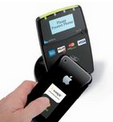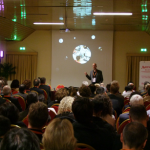Danielle Dalkie is a Co-founder and Director of Social Commerce & PR at Waspit, the groundbreaking mobile payments service. In this series of blog posts for NetworkMilan she will be writing about mobile payments technology, social commerce and trends in the tech startup sector with a focus on the Italian/European market. To kick off the series she Danielle starts by looking at the big picture of what the mobile payments environment looks like from her uniquely well-informed perspective!
Payments and mobile technology in Europe have always been ahead of the American market. I am not sure when the idea started that the US is better known for adopting technologies at an early stage: stateside mobile networks are about 10 years behind those of Europe – and their payment methods also lag those of the “Old World” by a decade, too.
US society still seems to be largely cash-based. Compare that with Europe, where today 6 out of 7 transactions are made using a card. But the difference goes even deeper. The technocrat government of Italy, in particular, has declared a war on cash: Prime Minister Mario Monti wants the country’s vast army of self-employed entrepreneurs, including landlords, plumbers, electricians and small businesses to stop making large transactions in cash, which critics say simply facilitates tax evasion. On 4 December 2011, the Italian government reduced the maximum limit for cash payment from 2,500 euros to 1,000 euros. The rationale for this reduced limit on movements of cash is that Italy desperately needs to increase its tax revenues and views its anti-cash measures as a means of cracking down on tax evasion, which “costs” the government an estimated €150 billion annually. However, with an eye-watering €1.9 trillion of public debt to its name, some commentators have described this kind of punitive measure as “too little too late”.
Against the backdrop of a general tendency towards the “cashless society”, the recent announcement by American Express that they have just released their roadmap for Europay MasterCard Visa (EMV) got me thinking about the state of the payments environment and how this technology could develop in the coming months and years.
Now, let me stick my neck out and say that I for one didn’t actually think the US should have made the switch over to EMV, since it has been used in Europe for the past six years and the technology itself – at over 10 years old – is well past its sell-by date. It would have made much more sense for the US to bypass EMV altogether and move straight to near field communication (NFC), which allows consumers to make electronic payments by simply waving their NFC-enabled phone near a payments terminal . Yes, EMV has security benefits, and it has helped to substantially decrease fraudulent transactions throughout Europe, but this should have been apparent to the US retailers and federal authorities 6 years ago. Why wait until now when more flexible and innovative technologies have superseded it?
One saving grace is that at least this switchover will force merchants to upgrade their terminals. Each of these upgraded system devices will also accept NFC and mobile transactions, which is a fantastic opportunity for companies operating in this space, especially startups and smaller, independent companies who (unlike the credit card giants) do not have the funds or capacity to influence terminal and Point of Sale (POS) technology or upgrades.
The innovative startup company I have been involved with over the last 18 months, Waspit, uses MasterCard PayPass technology and will be accepted by card-capable merchants in the US by 2017, by which time the proposed switch-over will be completed. This is clearly great news not only for consumers but for mobile payment startups, such as Waspit, generally. With merchants on board, socially-oriented financial services like ours will be able to focus on winning new customers and offering a wider range of related services and benefits
However, not all mobile / NFC payments technology are problem-free. PayPass, for example, and other card networks for mobile and micro payments, charge merchants 0.15% plus 0.025 Euro in the interchange every time a transaction is made. This means that if you’re buying a relatively low-value item , such as a 2 Euro ice-cream, the merchant is not actually making a profit. These increased costs may force small businesses to raise prices, or face margins being squeezed as they are unable to compete with larger retailers who enjoy greater economies of scale. (The European situation could also be affected by the recent $7.25 billion settlement by Visa and MasterCard of a class action brought by retailers in the US over interchange fees.)
From the merchant’s point of view it makes sense to bypass the credit card networks completely and go with the closed loop solution. The market has woken up to this fact with every tech company and startup offering some sort of mobile wallet, or mobile payment solution. You can now buy a latte with your Starbucks app , and even use your PayPal account in selected stores. But here’s the irony: all of this cashless technology is supposed to be making life simpler – except it’s not!
Behind the scenes, the situation is even more complicated, with the reliance on technologies such as those of the Trusted Service Manager (TSM) and over-the-air personalisation. When NFC handsets go mainstream and there is no longer a need for plastic at all, that is the moment when we will truly be in the era of mobile payments. But at present TSM is also in a state of flux. The mobile networks themselves are going to be the main players, but will Vodafone, Three, Orange (3 of the main UK operators) and the others be more flexible than the credit card companies, who currently control the scene? And the system will still rely on the infrastructure of the credit card companies, so interchange is still a factor. It is going to take a lot of hard bargaining, regulation and hammering out standards the key players in the industry can all agree on. No-one can say for sure how the situation will pan out – or how smaller players are going to get access to the chips that are vital for mobile payments to become the norm.
Consumers want to use electronic and mobile payments – and when the technology is fully rolled out I don’t think it will be hard getting them on board. However, in the industry we have been talking about this for a while. The flip side is that this is not good for merchants , especially small ones. Either the credit card companies need to come to the party or something needs to shake up the whole space. There needs to be more unity and maybe regulation, but this should not be dictated by the giants who dominate this space.
Consumers are clearly voting with their smart-phones: there is increasing demand and enthusiasm for making mobile payments more widespread and easier. Retailers – especially smaller, independent ones – could stand to benefit; and even government revenue-collecting agencies governments would welcome the introduction and greater use of this type of technology (with concerns over privacy being taken seriously, of course). There is also an urgent need for business itself, trade and consumer bodies, as well as national governments and the EU to co-ordinate their efforts to ensure that the consumer has a choice of easily accessible, safe and efficient payment methods to choose from. And, of course, there needs to be a level playing-field for innovative creative startups such as Waspit to develop services that give consumers the flexibility and freedom that this revolutionary technology could bring to people’s lives.
Read Danielle Dalkie’s next blog post on NetworkMilan – coming soon!
UPDATE (AUGUST 2012): Danielle has recently founded Network Roma, a sister group of the Milan Business English Network. You can become part of Network Roma by joining their group on LinkedIn.
























